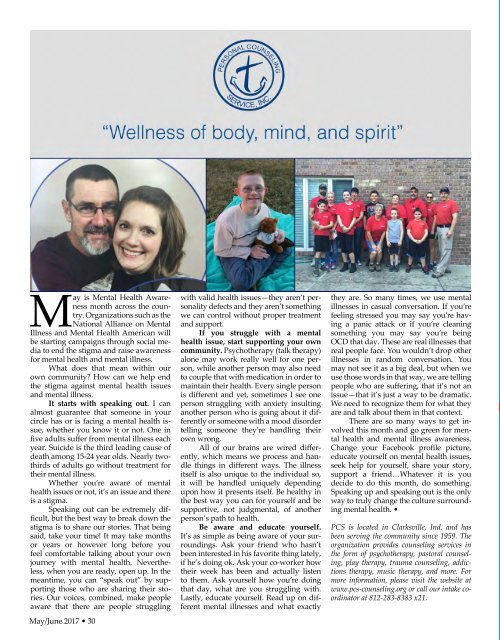Southern Indiana Living MayJune 2017
You also want an ePaper? Increase the reach of your titles
YUMPU automatically turns print PDFs into web optimized ePapers that Google loves.
May is Mental Health Awareness<br />
month across the country.<br />
Organizations such as the<br />
National Alliance on Mental<br />
Illness and Mental Health American will<br />
be starting campaigns through social media<br />
to end the stigma and raise awareness<br />
for mental health and mental illness.<br />
What does that mean within our<br />
own community? How can we help end<br />
the stigma against mental health issues<br />
and mental illness.<br />
It starts with speaking out. I can<br />
almost guarantee that someone in your<br />
circle has or is facing a mental health issue,<br />
whether you know it or not. One in<br />
five adults suffer from mental illness each<br />
year. Suicide is the third leading cause of<br />
death among 15-24 year olds. Nearly twothirds<br />
of adults go without treatment for<br />
their mental illness.<br />
Whether you’re aware of mental<br />
health issues or not, it’s an issue and there<br />
is a stigma.<br />
Speaking out can be extremely difficult,<br />
but the best way to break down the<br />
stigma is to share our stories. That being<br />
said, take your time! It may take months<br />
or years or however long before you<br />
feel comfortable talking about your own<br />
journey with mental health. Nevertheless,<br />
when you are ready, open up. In the<br />
meantime, you can “speak out” by supporting<br />
those who are sharing their stories.<br />
Our voices, combined, make people<br />
aware that there are people struggling<br />
May/June <strong>2017</strong> • 30<br />
with valid health issues—they aren’t personality<br />
defects and they aren’t something<br />
we can control without proper treatment<br />
and support.<br />
If you struggle with a mental<br />
health issue, start supporting your own<br />
community. Psychotherapy (talk therapy)<br />
alone may work really well for one person,<br />
while another person may also need<br />
to couple that with medication in order to<br />
maintain their health. Every single person<br />
is different and yet, sometimes I see one<br />
person struggling with anxiety insulting<br />
another person who is going about it differently<br />
or someone with a mood disorder<br />
telling someone they’re handling their<br />
own wrong.<br />
All of our brains are wired differently,<br />
which means we process and handle<br />
things in different ways. The illness<br />
itself is also unique to the individual so,<br />
it will be handled uniquely depending<br />
upon how it presents itself. Be healthy in<br />
the best way you can for yourself and be<br />
supportive, not judgmental, of another<br />
person’s path to health.<br />
Be aware and educate yourself.<br />
It’s as simple as being aware of your surroundings.<br />
Ask your friend who hasn’t<br />
been interested in his favorite thing lately,<br />
if he’s doing ok. Ask your co-worker how<br />
their week has been and actually listen<br />
to them. Ask yourself how you’re doing<br />
that day, what are you struggling with.<br />
Lastly, educate yourself. Read up on different<br />
mental illnesses and what exactly<br />
they are. So many times, we use mental<br />
illnesses in casual conversation. If you’re<br />
feeling stressed you may say you’re having<br />
a panic attack or if you’re cleaning<br />
something you may say you’re being<br />
OCD that day. These are real illnesses that<br />
real people face. You wouldn’t drop other<br />
illnesses in random conversation. You<br />
may not see it as a big deal, but when we<br />
use those words in that way, we are telling<br />
people who are suffering, that it’s not an<br />
issue—that it’s just a way to be dramatic.<br />
We need to recognize them for what they<br />
are and talk about them in that context.<br />
There are so many ways to get involved<br />
this month and go green for mental<br />
health and mental illness awareness.<br />
Change your Facebook profile picture,<br />
educate yourself on mental health issues,<br />
seek help for yourself, share your story,<br />
support a friend…Whatever it is you<br />
decide to do this month, do something.<br />
Speaking up and speaking out is the only<br />
way to truly change the culture surrounding<br />
mental health. •<br />
PCS is located in Clarksville, Ind. and has<br />
been serving the community since 1959. The<br />
organization provides counseling services in<br />
the form of psychotherapy, pastoral counseling,<br />
play therapy, trauma counseling, addictions<br />
therapy, music therapy, and more. For<br />
more information, please visit the website at<br />
www.pcs-counseling.org or call our intake coordinator<br />
at 812-283-8383 x21.

















